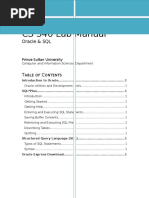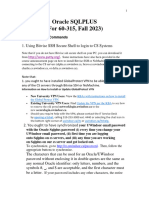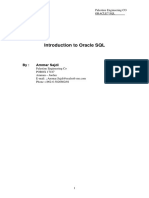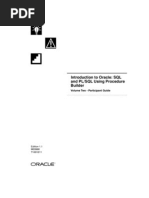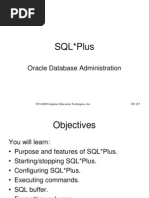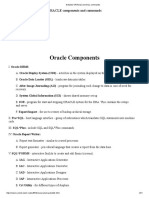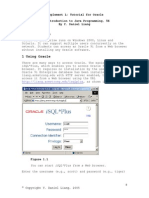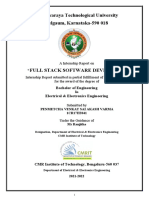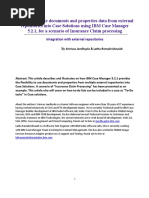SQLplus Commands
Uploaded by
gsandygSQLplus Commands
Uploaded by
gsandygSQL*Plus commands
@pathname
Run (START) an SQL Script
@MyScript.sql parameter1 parameter2 parameter3
In the SQL-Script, refer to the parameters as &1,
&2, and &3.
@ScriptName.sql will call sub-scripts from the
current working directory of SQL*Plus.
@C:\work\oracle\ScriptName.sql will call a subscript from a specific directory.
@@pathname
Run (START) an SQL Script
@@ will call a sub-script from the same directory
as the main script.
&variable
A substitution variable
&&variable
A substitution variable valid for the session.
/
buffer
Execute (or re-execute) commands in the SQL*Plus
does not list commands before running.
ACCEPT
User input
ACC[EPT] variable [NUM[BER]|CHAR|DATE] [FORMAT
format]
[DEFAULT default] [PROMPT text|NOPROMPT] [HIDE]
APPEND
buffer.
Add text to the end of the current line in the
A[PPEND] text_to_add
BREAK
BTITLE
page.
Specify where and how formatting will change.
BREAK ON {column|expr|ROW|REPORT} action
Place and format a title at the bottom of each
BTITLE printspec [text|variable]
BTITLE [OFF|ON]
CHANGE
just typed.)
Change text on the current line (change what you
C /oldval/newval
CLEAR
TIMING}
Clear the SQL*Plus screen and the screen buffer.
CLEAR {BREAKS|BUFFER|COLUMNS|COMPUTES|SCREEN|SQL
COLUMN
Change display width of a column.
COMPUTE
Calculate and display totals.
CONNECT
Connect to a database as a specified user:
connect username/password@SID
COPY
remote)
DEFINE
Copy data from a query into a table (local or
User variables:
DEFINE varName = String
Display a user variable:
DEFINE varName
Display all variables:
DEFINE
DEL
Delete the current line in the SQL buffer.
DESC[RIBE]
Describe a table, column, view, synonym, function
procedure, package or package contents.
DISCONNECT
Logoff (but don't exit)
EDIT
Load the SQL*Plus buffer into an editor.
By default, saves the file to AFIEDT.BUF
EXECUTE
Run a single PLSQL statement
EXEC :answer := EMP_PAY.BONUS('SMITH')
EXIT [n]
Commit, logoff and exit (n = error code)
EXIT SQL.SQLCODE
GET file
Retrieve a previously stored command file.
HELP topic
Topic is an SQL PLUS command or HELP COMMANDS
HOST
Execute a host operating system command.
HOST CD scripts
INPUT
Edit sql buffer - add line(s) to the buffer.
LIST n m
Edit sql buffer - display buffer lines n to m
For all lines - specify m as LAST
PAUSE message
Wait for the user to hit RETURN.
PRINT variable List the value of a bind variable or REF
Cursor (see VARIABLE / SHOW)
PROMPT message
REMARK
RUN
buffer
Echo a message to the screen.
REMARK comment or --comment--
or /* comment */
Execute (or re-execute) commands in the SQL*Plus
Lists the commands before running.
RUNFORM
SAVE file
command file.
Run a SQL*Forms application.
Save the contents of the SQL*Plus buffer in a
SAVE file [CRE[ATE] | REP[LACE] | APP[END]]
SET
Display or change SQL*Plus settings.
SHOW
List the value of a system variable (see PRINT)
SHUTDOWN [ABORT|IMMEDIATE|NORMAL|TRANSACTIONAL]
SPOOL file
Store query results in file
SPOOL OFF
Turn off spooling
SPOOL OUT sends file to printer
SQLPLUS
Start SQL*Plus and connect to a database.
STA[RT]
Run an SQL Script (see @)
STARTUP [NoMOUNT|MOUNT|OPEN]
TIMING
Record timing data TIMING {START | SHOW | STOP}
see CLEAR TIMING
TTITLE
Define a page title
UNDEFINE
Delete a user/substitution variable
varName (see DEFINE)
UNDEFINE
VARIABLE
Define a bind variable (Can be used in both
SQLPlus and PL/SQL)
VAR[IABLE] [variable {NUMBER|CHAR|CHAR(n)|
REFCURSOR}]
A RefCursor bind variable can be used to reference
PL/SQL cursor variables in stored procedures.
PRINT myRefCursor
EXECUTE somePackage.someProcedure(:myRefCursor)
VARIABLE on its own will display the definitions
made.
WHENEVER OSERROR
Exit if an OS error occurs
WHENEVER SQLERROR
Exit if an SQL or PLSQL error occurs
SQL*Plus Prompt:
To display the currently connected UserName and SID, instead of just SQL>
SET sqlprompt '&_user:&_connect_identifier > '
Add the line above to the file: $ORACLE_SID/sqlplus/admin/glogin.sql (this tip requires
Oracle 10g or greater)
You might also like
- (Ebook - PDF) Oracle SQL-Plus Quick ReferenceNo ratings yet(Ebook - PDF) Oracle SQL-Plus Quick Reference20 pages
- SQL Plus: A Command Line DOS-like Interface Which Can Provide Users An Environment To ExecuteNo ratings yetSQL Plus: A Command Line DOS-like Interface Which Can Provide Users An Environment To Execute5 pages
- SQL Plus®: Quick Reference Release 10.2No ratings yetSQL Plus®: Quick Reference Release 10.220 pages
- Physically Writes Pending Data To The File Identified by The File HandleNo ratings yetPhysically Writes Pending Data To The File Identified by The File Handle3 pages
- SQL Plus: Oracle Database AdministrationNo ratings yetSQL Plus: Oracle Database Administration32 pages
- Oracle Database 11g SQL and PLSQL New FeaturesNo ratings yetOracle Database 11g SQL and PLSQL New Features232 pages
- Selecting Data From Oracle: $ Sqlplus Jason/athenaNo ratings yetSelecting Data From Oracle: $ Sqlplus Jason/athena32 pages
- Asic SQL Reports and Commands Setting FeedbackNo ratings yetAsic SQL Reports and Commands Setting Feedback8 pages
- SQL Plus: PL/SQL Blocks On The Results of A Query in The Form of ReportsNo ratings yetSQL Plus: PL/SQL Blocks On The Results of A Query in The Form of Reports57 pages
- Installation and Management of Oracle 11g Express Edition Release 2100% (1)Installation and Management of Oracle 11g Express Edition Release 26 pages
- 1.1.1 Frequently Accessed URL.: SQL Plus FAQNo ratings yet1.1.1 Frequently Accessed URL.: SQL Plus FAQ45 pages
- (Ebook) Oracle SQL*Plus : pocket reference by Jonathan Gennick ISBN 9780596008857, 0596008856 instant download100% (2)(Ebook) Oracle SQL*Plus : pocket reference by Jonathan Gennick ISBN 9780596008857, 0596008856 instant download47 pages
- Develop and Test SQL: SQL Plus Is A Development EnvironmentNo ratings yetDevelop and Test SQL: SQL Plus Is A Development Environment3 pages
- Presented By: Dr. Michel Mitri James Madison UniverisityNo ratings yetPresented By: Dr. Michel Mitri James Madison Univerisity127 pages
- Producing Readable Output With SQL Plus: ObjectivesNo ratings yetProducing Readable Output With SQL Plus: Objectives34 pages
- PL/SQL. in This Tutorial, You Will Interact With Oracle Database, Thru SQL Plus, by Issuing ANo ratings yetPL/SQL. in This Tutorial, You Will Interact With Oracle Database, Thru SQL Plus, by Issuing A12 pages
- Basic Introduction To SQL PLUS: Getting StartedNo ratings yetBasic Introduction To SQL PLUS: Getting Started6 pages
- Oracle: SQL Plus Tutorial: Logging On/OffNo ratings yetOracle: SQL Plus Tutorial: Logging On/Off8 pages
- Supplement L: Tutorial For Oracle For Introduction To Java Programming, 5E by Y. Daniel LiangNo ratings yetSupplement L: Tutorial For Oracle For Introduction To Java Programming, 5E by Y. Daniel Liang7 pages
- SAP interface programming with RFC and VBA: Edit SAP data with MS AccessFrom EverandSAP interface programming with RFC and VBA: Edit SAP data with MS AccessNo ratings yet
- PRE SUBMTION REPORT of Online Job Portal (Python)100% (1)PRE SUBMTION REPORT of Online Job Portal (Python)9 pages
- 3dcart Shopping Cart Software V3.X: Promotion GuideNo ratings yet3dcart Shopping Cart Software V3.X: Promotion Guide17 pages
- 80 bài hướng dẫn chi tiết tạo Web Layout bằng photoshop: Design a cool Photography PortfolioNo ratings yet80 bài hướng dẫn chi tiết tạo Web Layout bằng photoshop: Design a cool Photography Portfolio39 pages
- How To Hack Windows Administrator PasswordNo ratings yetHow To Hack Windows Administrator Password5 pages
- HubSpot - Social Media Image Size TemplateNo ratings yetHubSpot - Social Media Image Size Template14 pages
- How To Integrate Documents and Properties Data From External Repositories Into Case Solutions Using IBM Case Manager 5.2.1, For A Scenario of Insurance Claim ProcessingNo ratings yetHow To Integrate Documents and Properties Data From External Repositories Into Case Solutions Using IBM Case Manager 5.2.1, For A Scenario of Insurance Claim Processing14 pages
- Emil Cioran Do Inconveniente de Ter Nascido 12010 Letra Livre PDF FreeNo ratings yetEmil Cioran Do Inconveniente de Ter Nascido 12010 Letra Livre PDF Free186 pages
